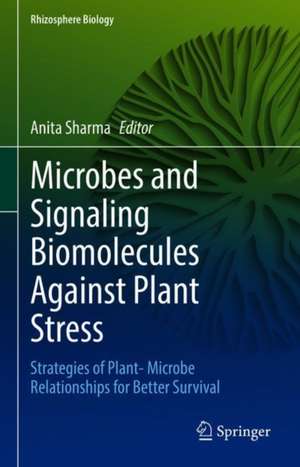Microbes and Signaling Biomolecules Against Plant Stress: Strategies of Plant- Microbe Relationships for Better Survival: Rhizosphere Biology
Editat de Anita Sharmaen Limba Engleză Hardback – 7 noi 2020
This book sheds new light on ways to alleviate biotic and abiotic stress in plants, using signaling molecules of plant growth promotory rhizobacteria. Further, it elaborates on the different types of stress and strategies used by plants under various stress conditions.
The respective sections describe the importance of the microbiome for the overall health of plants and how exploring plant-microbe communication and signaling pathways could offer a promising avenue for future research. The book also discusses how rhizobacteria could be exploited in stress alleviation and sustainable agriculture, and addresses omics strategies for stress response and mitigation. Thanks to clearly annotated references, the book also supports and encourages readers to further explore the topics discussed.
Preț: 948.92 lei
Preț vechi: 1157.22 lei
-18% Nou
Puncte Express: 1423
Preț estimativ în valută:
181.60€ • 197.19$ • 152.54£
181.60€ • 197.19$ • 152.54£
Carte disponibilă
Livrare economică 01-15 aprilie
Preluare comenzi: 021 569.72.76
Specificații
ISBN-13: 9789811570933
ISBN-10: 9811570930
Pagini: 294
Ilustrații: XVIII, 294 p. 16 illus., 14 illus. in color.
Dimensiuni: 155 x 235 mm
Greutate: 0.54 kg
Ediția:1st ed. 2021
Editura: Springer Nature Singapore
Colecția Springer
Seria Rhizosphere Biology
Locul publicării:Singapore, Singapore
ISBN-10: 9811570930
Pagini: 294
Ilustrații: XVIII, 294 p. 16 illus., 14 illus. in color.
Dimensiuni: 155 x 235 mm
Greutate: 0.54 kg
Ediția:1st ed. 2021
Editura: Springer Nature Singapore
Colecția Springer
Seria Rhizosphere Biology
Locul publicării:Singapore, Singapore
Cuprins
Chapter 1. Rhizospheric engineering for sustainable agriculture.- Chapter 2. Stress alleviation in plants using sar and isr: current views on stress signalling network.- Chapter 3. Plant – microbe interaction: a sustainable strategy to elevate salinity tolerance in plants.- Chapter 4. Concepts and application of plant-microbe interaction in remediation of heavy metals.- Chapter 5. Abiotic stress: its outcome and tolerance in plants.- Chapter 6. Physiological and molecular aspects of retrieving environmental stress in plants by microbial interactions.- Chapter 7. Plant-microbe interactions: an insight into the underlying mechanisms to mitigate diverse environmental stresses. Chapter 8. Omics technology: role and future in providing biotic and abiotic stress tolerance to plants. Chapter 9. Role of arbuscular mycorrhizal fungi in amelioration of drought stress in crop plants. Chapter 10. Drought stress tolerance: an insight to resistance mechanismand adaptation in plants. Chapter 11. Phytoremediation: a synergistic interaction betweenplants and microbes for removal of unwanted chemicals/contaminants. Chapter 12. Involvement of synergistic interactions between plants and rhizospheric microbes for the removal of toxic /hazardous contaminants.- Chapter 13. Understanding the role of microbes and plants in the management of heavy metal stress: a current perspective. Chapter 14. Ros signalling under oxidative stress in plants.- Chapter 15. Bacterial antagonists effective against soil borne and foliar pathogens.
Notă biografică
Dr Anita Sharma is presently working as a Professor at the Department of Microbiology, GBPUA&T, Pantnagar. She is an alumnus of Pant Nagar University and obtained her M.Sc. degree in 1981 in Microbiology with a minor in Biochemistry. She has been a recipient of merit scholarships throughout her academic career. She obtained her PhD from BHU in 1990. She was awarded a two-year CSIR Fellowship for her project on Nitrogen Fixation by Cyanobacteria, after which she explored plant growth promotory Rhizobacteria in a DBT-funded project at the Department of Microbiology, Pantnagar. She joined the Department of Microbiology, Gurukul Kangri University, in 1997, and took on her current position at the Department of Microbiology, Pantnagar, in 1999.
Textul de pe ultima copertă
This book sheds new light on ways to alleviate biotic and abiotic stress in plants, using signaling molecules of plant growth promotory rhizobacteria. Further, it elaborates on the different types of stress and strategies used by plants under various stress conditions.
The respective sections describe the importance of the microbiome for the overall health of plants and how exploring plant-microbe communication and signaling pathways could offer a promising avenue for future research. The book also discusses how rhizobacteria could be exploited in stress alleviation and sustainable agriculture, and addresses omics strategies for stress response and mitigation. Thanks to clearly annotated references, the book also supports and encourages readers to further explore the topics discussed.
Caracteristici
Comprehensively addresses the various stress response strategies used by plants Sheds new light on the role of the microbiome in plant stress alleviation Elaborates on the use of rhizobacteria for sustainable agriculture and better environmental health













